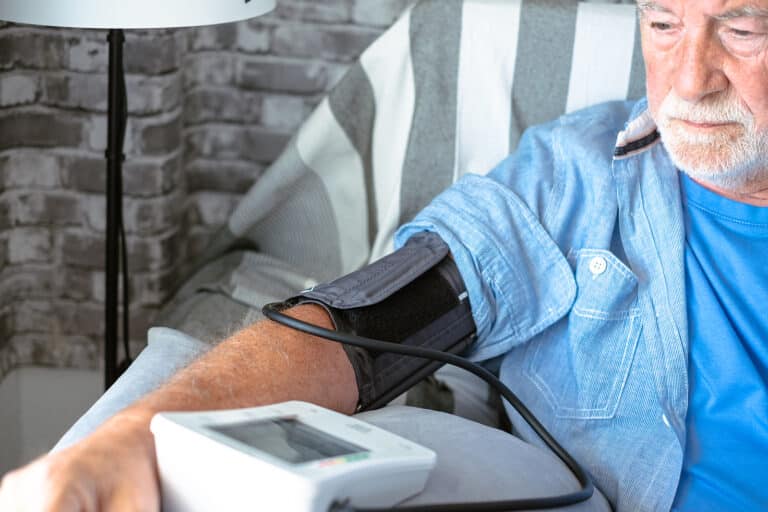It’s very common for seniors to develop high blood pressure as they get older. Circulation problems and other health concerns can contribute to high blood pressure. Seniors should be regularly monitoring their blood pressure and talking to their doctor about lowering it because high blood pressure can increase the risk of heart attacks and strokes for seniors.
Live-in home care can help seniors who are living independently do things that can help lower their blood pressure like eating a healthy diet. And live-in home care can also help seniors monitor their blood pressure regularly. With help from a home care provider, seniors can try these things to lower their blood pressure:
Maintain a Healthy Diet
Seniors should focus on a balanced diet rich in fruits, vegetables, whole grains, lean proteins, and low-fat dairy products. Reducing sodium intake is especially important, as excessive salt can lead to high blood pressure. Seniors should aim for no more than 2,300 milligrams of sodium per day. It can be tough for seniors to make a healthy diet a habit, but having live-in home care can make it easier.
Exercise Regularly
Exercise is one of the best things seniors can do to improve their health. Engaging in physical activity can help seniors maintain a healthy weight and lower blood pressure. Activities like brisk walking, swimming, or gentle yoga can be beneficial. Aim for at least 150 minutes of moderate-intensity exercise per week, as recommended by health experts.
Limit Alcohol Consumption
Seniors should consume alcohol in moderation or avoid it altogether. Excessive alcohol can raise blood pressure and interfere with medications. For those who choose to drink, it’s advised to limit it to one drink per day for women and up to two drinks per day for men.
Quit Smoking
There are many reasons why seniors who smoke should quit. Smoking is a significant risk factor for high blood pressure and heart disease. Seniors who smoke can get medication to help them quit or use other tools that can help them kick the smoking habit.
Manage Stress
Chronic stress can contribute to high blood pressure. Seniors can manage stress through relaxation techniques such as meditation, deep breathing exercises, or mindfulness. Engaging in hobbies, spending time with loved ones, and seeking emotional support can also help reduce stress.
Monitor Blood Pressure
Seniors should regularly check their blood pressure at home or through medical appointments. Tracking blood pressure levels allows for early intervention if readings are consistently high. Blood pressure readers are available at any drugstore, and most allow seniors to check the blood pressure for free whenever the pharmacy is open.
Medication Compliance
If prescribed medication to manage blood pressure, seniors should take it as directed by their healthcare provider. Skipping doses or stopping medication abruptly can lead to spikes in blood pressure.
Reduce Caffeine Intake
Seniors should be mindful of their caffeine consumption, as it can temporarily increase blood pressure. Switching to decaffeinated options or reducing overall caffeine intake can be beneficial. Hidden caffeine in foods and beverages can mean that seniors are getting more caffeine than they release. Read labels carefully and keep track of caffeine intake.
Get Adequate Sleep
Quality sleep is crucial for blood pressure regulation. Seniors should aim for 7-9 hours of restful sleep per night. Creating a comfortable sleep environment and maintaining a consistent sleep schedule can improve sleep quality.
Stay Hydrated
Dehydration can affect blood pressure levels. Seniors should drink enough water throughout the day, aiming for at least 8-10 cups of water daily, unless otherwise advised by a healthcare professional.
Limit Processed Food
Processed and high-sugar foods can contribute to high blood pressure. Seniors should opt for whole, unprocessed foods and read food labels to check for hidden sources of sodium and added sugars.
Lose Weight if Necessary
If seniors are overweight or obese, even modest weight loss can significantly lower blood pressure. Consult with a healthcare provider for guidance on a safe and effective weight loss plan.
Amelia Home Care provides traditional live-in home care services, along with virtual caregiving and remote patient monitoring. Our service area includes Brooklyn, Bronx, Manhattan, Queens, Staten Island, and Westchester County. Call today at (929) 333-3955.
We proudly provide non-medical home care services to individuals with disabilities, injuries, difficulties with mobility, or illnesses. Our team is composed of highly trained and competent staff members who are dedicated and experts in delivering home care services in the comfort of our client’s home.
Through our personalized care plan, we can give you the needed care services that are all intended to cater to your unique personal and health needs. With us, we ensure around-the-clock services and supervision to help you achieve optimum health and wellness.
- Exploring Dental Emergencies: Support and Care Tips - July 26, 2024
- 5 Ways Seniors Living At Home Can Lower Their Risk Of Loneliness - July 8, 2024
- Understanding the Causes of Cataracts in Seniors - June 28, 2024
